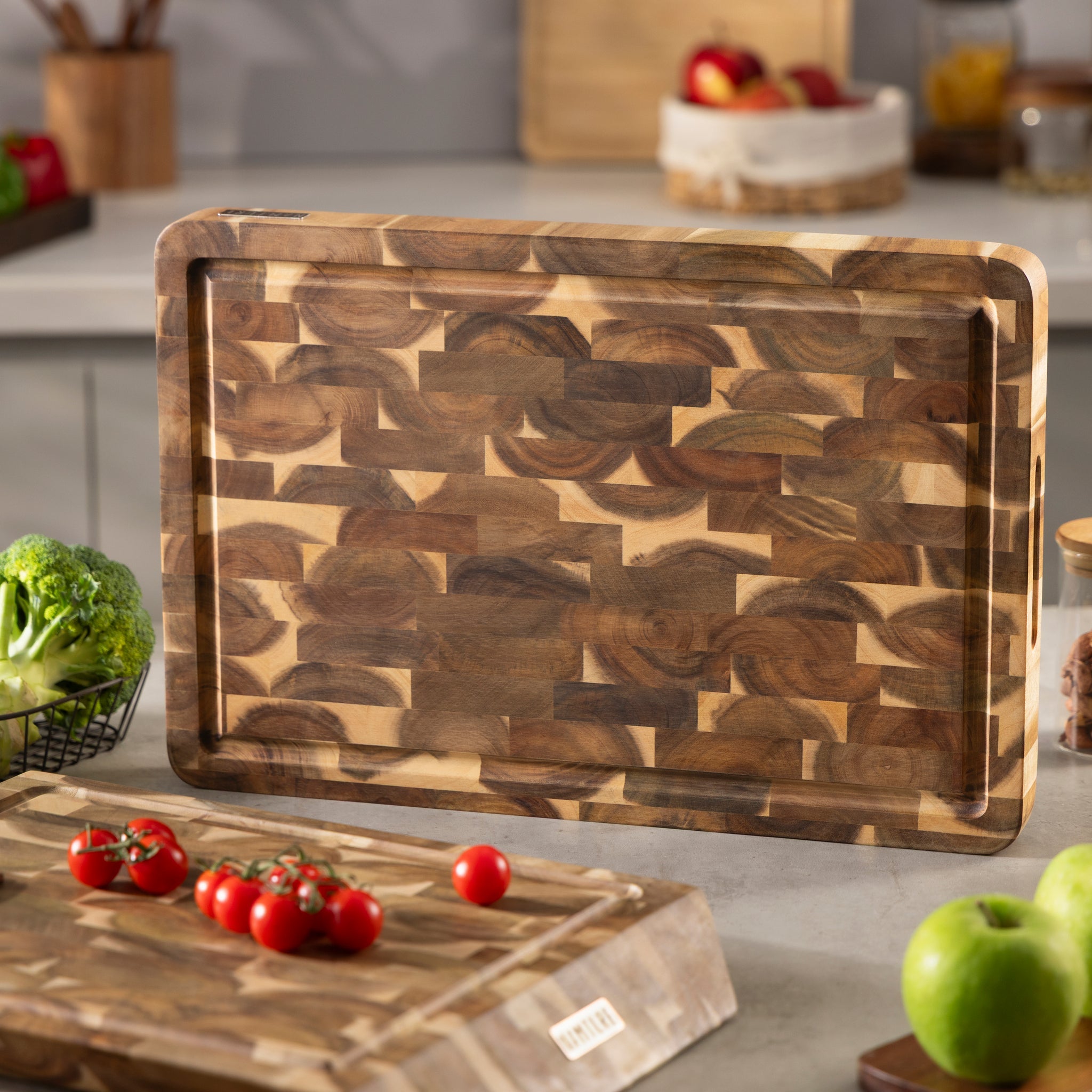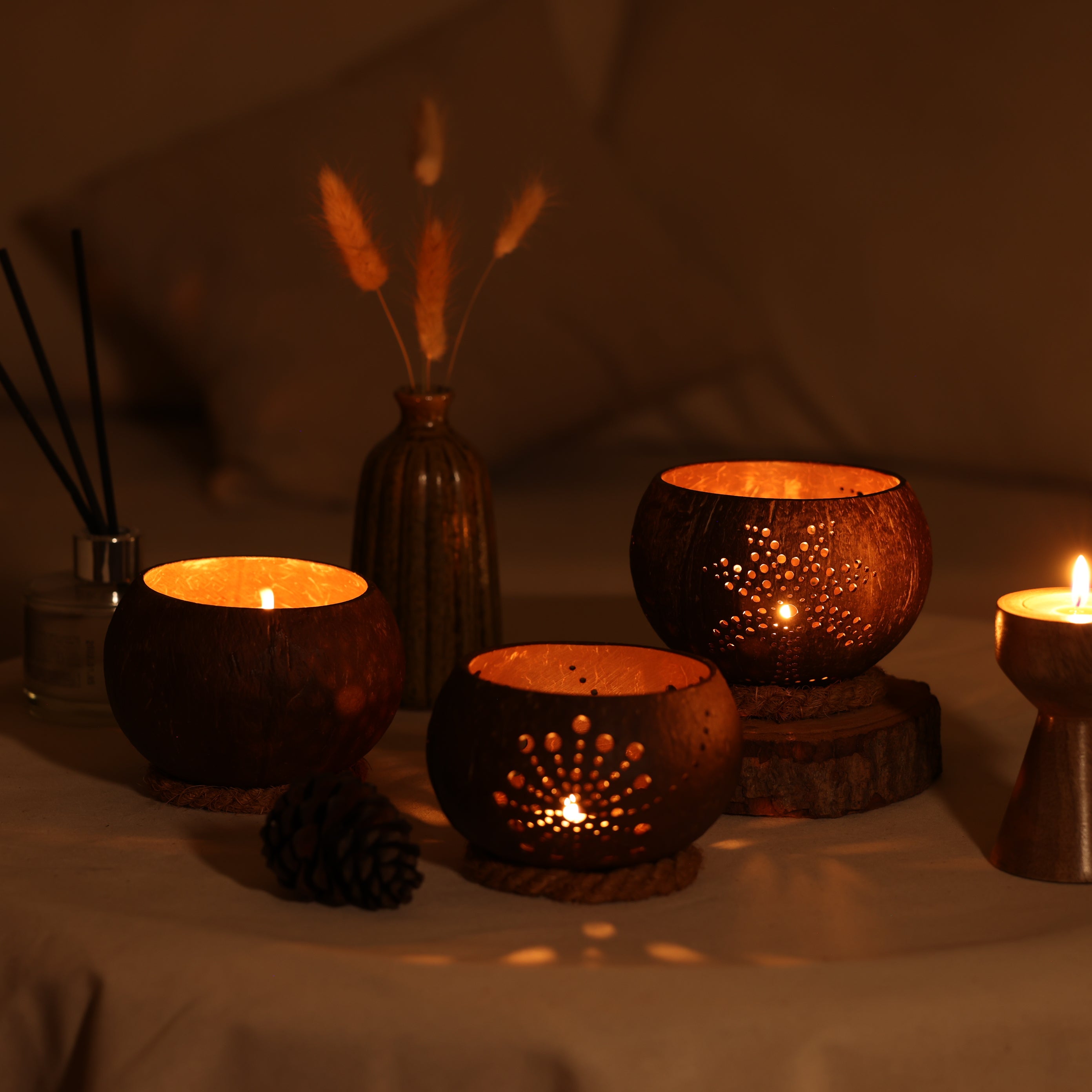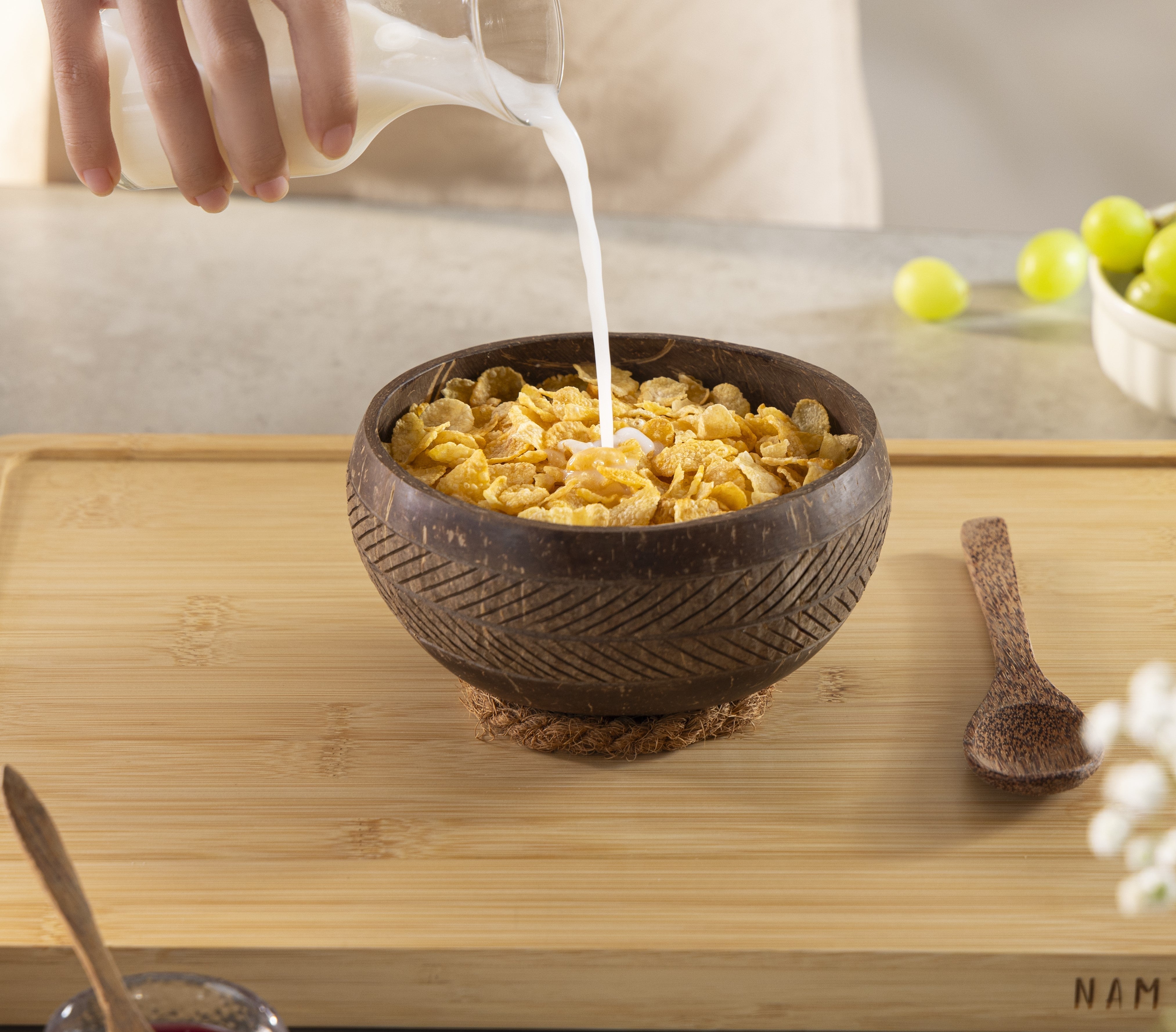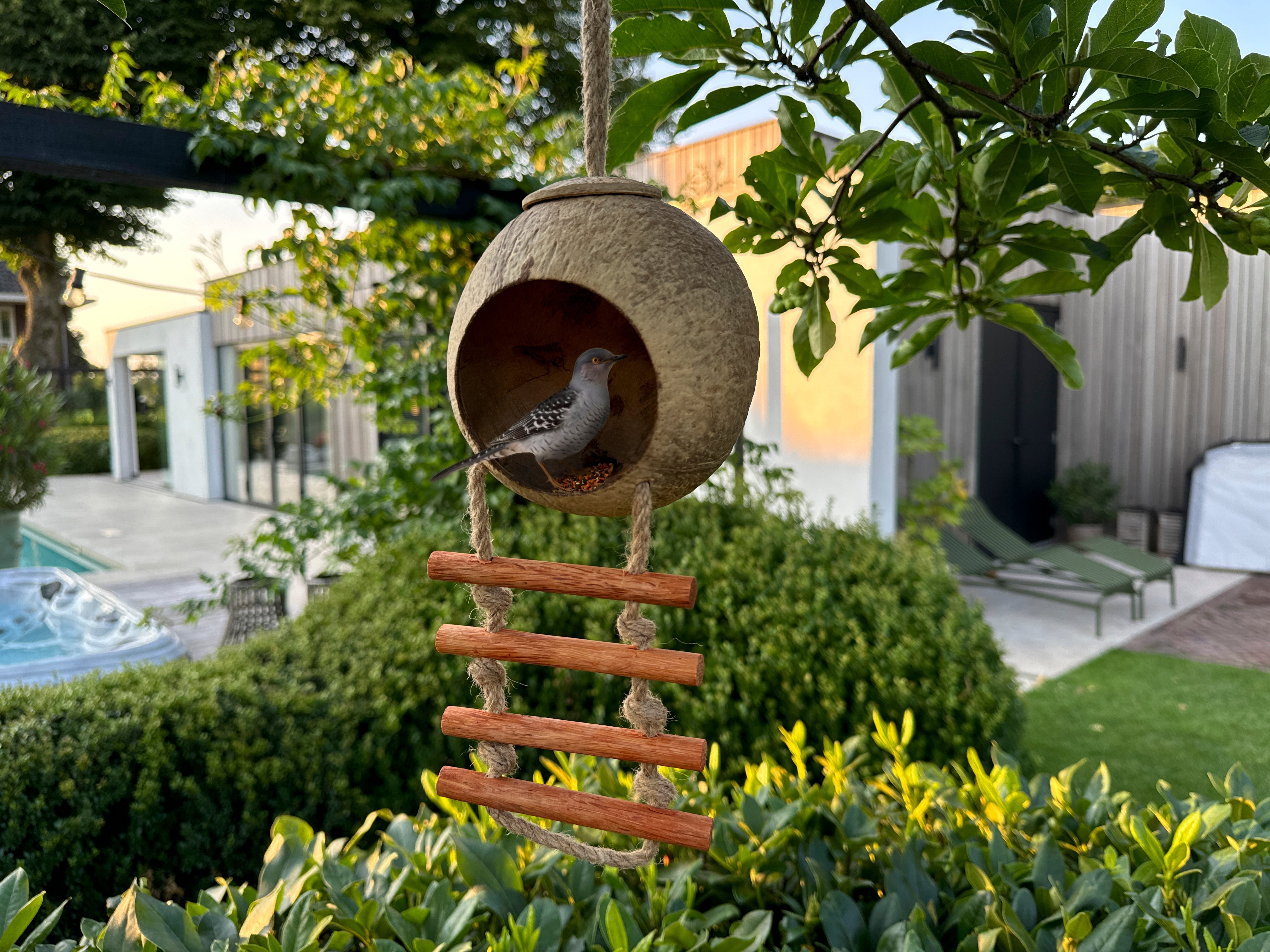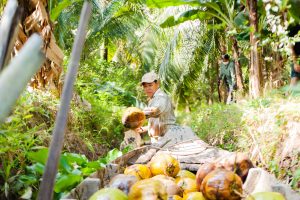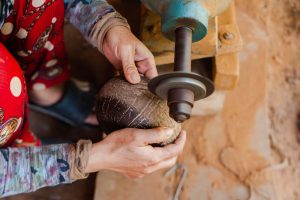Story of… Namture maakt impact met ‘waardeloze’ kokosnootschillen
Wat doe je als je aan de lopende band op de Vietnamese straten kokosnootschillen verbrand ziet worden? Bestempeld als ‘waste’, maar eigenlijk nog van zoveel waarde. Jan heeft er – inmiddels samen met z’n broer – zijn business van gemaakt. Namture is de naam en ze maken van natuurproducten duurzame en bovenal handige producten voor de alledaagse dag.
Nuts about… Namture
Een aantal jaren terug reisde Jan tijdens een studieperiode vanuit het Gelderse Ermelo naar Maleisië af. Het Verre Oosten boeide hem en zorgde ervoor dat hij zijn reis vervolgde naar Vietnam. Daar is hij verliefd geworden en the rest is history. Waar hij in Nederland z’n brood als financial verdiende, kriebelde het – eenmaal in zijn nieuwe thuisland gesetteld – om een eigen onderneming te beginnen. Zijn nieuwe werk lag letterlijk voor het oprapen. Hoe zit dat? “Overal waar ik tijdens een trip naar Bến Tre in de Mekong Delta liep, lagen er kokosnoten op straat”, vertelt Jan. “Ze lagen klaar om te worden verbrand. Zonde, want ze mankeren niets! Daar moest toch nog iets van te maken zijn?”

En dat dat zéker kon, daar kwam hij al snel achter. Hij is de mogelijkheden gaan uitzoeken en fast forward is Namture nu een goed gevulde webshop van natuurlijke kokosnoot bakjes tot kokosnoot kaarsen én bamboe producten. “En binnenkort komen daar ook snijplanken bij”, vult Jan aan. “Want we kunnen niet alleen de kokosnoten een tweede leven geven, maar eigenlijk de hele boom. Zijn de bomen 60 à 70 jaar oud, dan zijn ze ‘op’ en worden ze verbrand, omdat de lokale bevolking niets met het hout kan. Na op eigen houtje wat onderzoek te hebben gedaan, blijkt er op een bepaalde manier toch nog genoeg moois van het hout te kunnen worden gemaakt.”
Nadat Jan z’n zinnen op het upcyclen van kokosnootschillen (en inmiddels de hele boom) had gezet, is hij naar fabrieken op zoek gegaan waar de mensen goed worden behandeld. “In tegenstelling tot de verhalen die we kennen, worden hier geen kokosnoten door apen uit de bomen getrokken. Op een gegeven moment ben ik zelf op de plantages gaan slapen om te zien of de mensen daadwerkelijk goed worden behandeld (dat bleek zo te zijn), maar ook om het hele productieproces beter te begrijpen (van het plukken van de kokosnoten tot het polijsten van de bowls) én om een sterke band met de eigenaresse op te bouwen.”
Toen het basisidee stond, heeft broer Marinus zich in het verhaal gemengd. Als brandweerman werkt hij vaak 24 uur achter elkaar, waarna hij tussen de shifts door twee dagen vrij is. Marinus: “Ik wilde deze tijd nuttig besteden, waardoor ik ben aangehaakt om Namture in Nederland handen en voeten te geven. We willen ons bedrijf hier verder uitrollen.”
Wereldse impact. Lokaal initiatief
Net na corona zijn de mannen de krachten gaan bundelen. Pak ‘m beet een jaar zijn ze nu bezig. Wat drijft hen om Namture te runnen? “Voor mij persoonlijk is het het belangrijkst dat we in Vietnam grote impact maken en daarmee wereldwijd,” vertelt Jan. “Met het hergebruiken van ‘afval’ – de kokosnoten – creëren we niet alleen banen, maar kunnen we ook ons steentje bijdragen als het om bewustwording over het gebruik van plastic van de lokale bevolking gaat. In de supermarkt pakken ze een product vaak dubbel in plastic in om het daarna in nóg meer plastic (lees: plastic tas) te stoppen.”
En dat plastic blijkt niet tot de supermarkt beperkt te blijven. “De lokale bevolking drinkt kokoswater het liefst niet direct uit de kokosnoot, maar ze schenken het over in een plastic beker met een plastic tasje eromheen en plastic rietje erin. Dat kan anders!”
Marinus vult aan: “Doordat we onze producten op een duurzame manier laten produceren, hebben we impact op de lokale bevolking. En daarbij heeft Namture een effect wereldwijd, omdat we de makers in Vietnam bewust maken om te minderen met plastic en daarmee plasticminderen we in Nederland. Er valt nog veel winst te behalen. Denk alleen al aan een duurzaam huishouden zonder plastic verpakkingen. Grote stappen in korte tijd zetten, daar gaan we in samenwerking met de lokale bevolking voor.”
Hier houdt het duurzaam bezig zijn voor de ondernemers niet op. “We doneren een deel van onze opbrengst aan het goede doel om ook via die weg de lokale bevolking te supporten én stimuleren om duurzamer te leven. Mijn vriendin komt hier om de hoek kijken, omdat ze precies weet waar er in Vietnam behoefte aan extra (financiële) support is,” vertelt Jan.
Omgekeerde wereld
Wat ondergetekende zo aanspreekt aan het verhaal van Namture, is dat de heren letterlijk hun bedrijfsidee op straat tegen het lijf zijn aangelopen. En dat, dat heeft z’n impact op hun manier van leven gehad. Tot dan toe waren Jan en Marinus – grootgebracht in een traditioneel gezin van zes – niet bezig met duurzaamheid. Hoe ziet het proces naar een duurzamere levensstijl er voor de heren tot dusver uit?
Jan vertelt dat hij bewuster is gaan leven toen hij de oversteek naar Vietnam maakte. “Toegegeven, in Nederland had ik altijd het gevoel dat het duurzamer leven door bepaalde mensen door je strot – pardon my French – werd geduwd. Diezelfde mensen leefden zelf vaak niet eens zo en bovendien hadden ze naar mijn mening geen idee wat er in de landen waar de producten gemaakt worden, gebeurde. En daarbij kreeg ik het gevoel dat het hen vaak niet uitmaakt wat er in de rest van de wereld gebeurt, als we het in Nederland maar doen zoals het ‘hoort.’ Precies dat zorgde bij mij voor weerstand.”
Nadat Namture meer en meer vorm kreeg, ging hij zelf ook over zijn dagelijkse leven inclusief huis-, tuin- en keukenproducten nadenken. “Als ik nu zie hoe ik zelf door het gebruik van onze producten ben veranderd en hoe de makers van onze producten zelf met nul komma nul plastic leven, dan ben ik trots.”
Verder eet Jan tegenwoordig stukken makkelijker vegetarisch. “In Nederland at ik altijd aardappels, vlees en groenten. Echter, hier in Vietnam is het een paradijs voor vegans, waardoor ik zelf het belang van vlees steeds minder ben gaan zien. Dus ik eet bij lange na niet meer dagelijks vlees.”
Op de vraag of Jans’ Vietnamese vriendin duurzaamheid belangrijk vindt, vertelt hij dat hij wel een positief verschil in generaties merkt. “Haar generatie staat er veel meer voor open dan de generatie van haar ouders. Ze zien dat het anders moet, alleen leven ze vaak nog in de overlevingsstand; ze moeten het eerst zelf goed hebben, voordat een duurzamer leven leiden prioriteit wordt. Neemt niet weg dat ik op universiteiten zie dat er grote groepen duurzame producten beginnen te gebruiken en het bewustzijn groeit.”
Ook voor Marinus had duurzaamheid nooit echt een rol in zijn leven gespeeld. Sinds Namture is dat behoorlijk veranderd. “Ik kan wel stellen dat ik nu veel bewuster ben van wat ik aan producten in huis haal, eet etc. Het zijn alle kleine stappen bij elkaar waarmee je het verschil als individu kunt maken. Eigenlijk kun je wel zeggen dat ik van nul een veel bewuster mens ben geworden. Anno nu heb ik een goede duurzame basis.”
Hij vult aan dat het ‘m niet in de perfectie zit. “Als individu kun je beter dingen goed doen en mensen met producten en verhalen inspireren, dan dat je alles ‘perfect’ doet en mensen niet inspireert. Bij Namture stimuleren we consumenten en bedrijven om voor die eerste route te kiezen.”

Ondernemerslessen van Namture
Net als veel andere ‘we gaan voor groen’-ondernemers hebben ook Jan en Marinus in het begin de opmerking gekregen: ‘Succes, dat krijgen jullie toch niet van de grond’. Maar de mannen zijn erin blijven geloven. Wat zijn de lessen die ze andere duurzame ondernemers willen meegeven? “Laat je niet door de laagste prijs leiden. In sommige fabrieken zouden we minder voor materialen moeten betalen, maar dan zouden medewerkers slechter worden behandeld. De lagere prijs betalen de medewerkers dus figuurlijk. Als je een duurzaam product verkoopt, dan moet de productie ook duurzaam en maatschappelijk verantwoord zijn, vinden wij.”
Marinus vult zijn broer aan: “Ben je startend ondernemer maak dan gebruik van de subsidies die er voor beginnende duurzame ondernemers zijn. Er zijn er meer dan je denkt! Zo kwamen we bijvoorbeeld uit bij de subsidie vanuit ‘De Startversneller’. In de provincie Gelderland en Overijssel hebben ze deze subsidie. Hiervoor kun je je aanmelden, waarna je bedrijf wordt beoordeeld en je € 1.000,- krijgt om coaching als starters te krijgen. En zo zijn er nog veel meer andere potjes waar je recht op hebt.”
